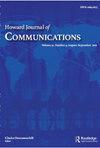Men Sharea El Haram : The Ethics of Masculinity and its Vernacular discourse in Kuwaiti Television
IF 0.8
Q3 COMMUNICATION
引用次数: 0
Abstract
AbstractThis paper provides a cultural analysis of the popular Kuwaiti TV series Men Sharea El Haram (translated as From Haram Street). Combining religion, class, race, nationality, and patriarchy, Haram Street showcases pertinent issues that today’s Kuwaiti society has to face. Attending to the scarcity of previous research on vernacular communities and their salient concerns, this paper explores the following research questions: How does Men Sharea El Haram capture the intersecting nature of women’s resistance? What does a feminist Kuwaiti vernacular look like, and how does it intersect with privilege?The analysis outlines how Men Sharea El Haram touches upon several silenced themes in the conservative Kuwaiti society of Kuwait, showing the many and varied ways in which Kuwaiti women are oppressed and showcasing the ways in which women can—and do—resist. Together, the findings provide a deeper understanding of several central issues in Kuwaiti society, especially around masculinity.Keywords: feminismintersectionalityKuwaitmasculinityMiddle Eastpatriarchyvernacular discourse Disclosure statementNo potential conflict of interest was reported by the author.Notes1 The hegemonic dimensions of the Men Sharea El Haram series, which are duly acknowledged here, are however beyond of the scope of this paper.2 While I invested much effort into conveying the meaning in English as close to the Arabic original as possible, I am aware of the risks associated with translation and have translated the script as accurately as possible without losing the meaning.男人分享圣地:科威特电视中的男子气概伦理及其白话话语
摘要本文对科威特热门电视剧《来自哈拉姆街》进行了文化分析。结合宗教,阶级,种族,国籍和父权制,哈拉姆街展示了当今科威特社会必须面对的相关问题。鉴于以往对白话社区研究的缺乏及其突出的问题,本文探讨了以下研究问题:“男人分享埃尔哈拉姆”如何捕捉到女性抵抗的交叉性?女权主义的科威特方言是什么样子的?它又是如何与特权相交的?该分析概述了Men Sharea El Haram如何触及科威特保守的科威特社会中几个被沉默的主题,展示了科威特妇女受到压迫的多种方式,并展示了妇女能够-并且确实-抵抗的方式。总之,这些发现让我们对科威特社会的几个核心问题有了更深入的了解,尤其是关于男子气概的问题。关键词:女性主义交叉性科威特男性主义中东父权制方言话语披露声明作者未报告潜在的利益冲突。注1:此处适当承认的Men Sharea El Haram系列的霸权维度超出了本文的范围虽然我花了很多精力用英语表达的意思尽可能接近阿拉伯语原文,但我意识到翻译的风险,并在不丢失意思的情况下尽可能准确地翻译了剧本。
本文章由计算机程序翻译,如有差异,请以英文原文为准。
求助全文
约1分钟内获得全文
求助全文
来源期刊

Howard Journal of Communications
COMMUNICATION-
CiteScore
2.70
自引率
10.00%
发文量
23
期刊介绍:
Culture, ethnicity, and gender influence multicultural organizations, mass media portrayals, interpersonal interaction, development campaigns, and rhetoric. Dealing with these issues, The Howard Journal of Communications, is a quarterly that examines ethnicity, gender, and culture as domestic and international communication concerns. No other scholarly journal focuses exclusively on cultural issues in communication research. Moreover, few communication journals employ such a wide variety of methodologies. Since issues of multiculturalism, multiethnicity and gender often call forth messages from persons who otherwise would be silenced, traditional methods of inquiry are supplemented by post-positivist inquiry to give voice to those who otherwise might not be heard.
 求助内容:
求助内容: 应助结果提醒方式:
应助结果提醒方式:


